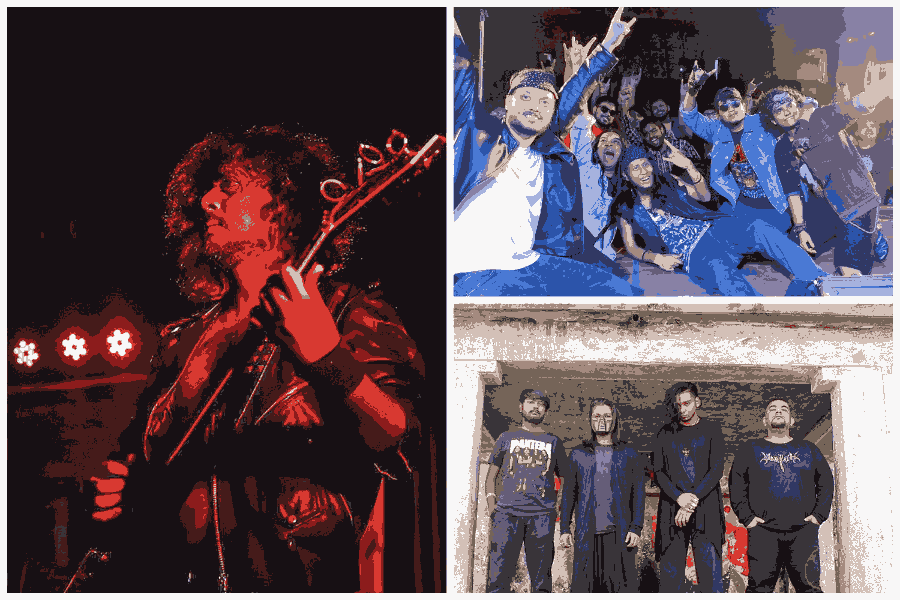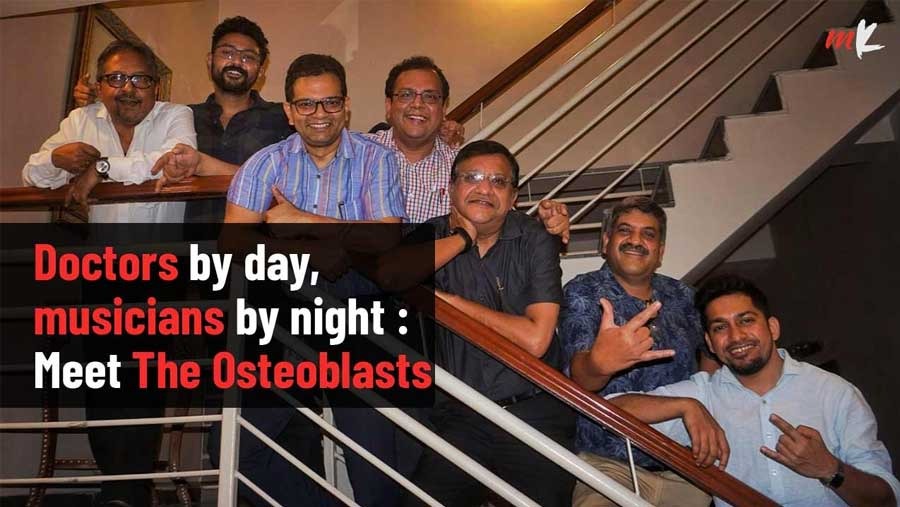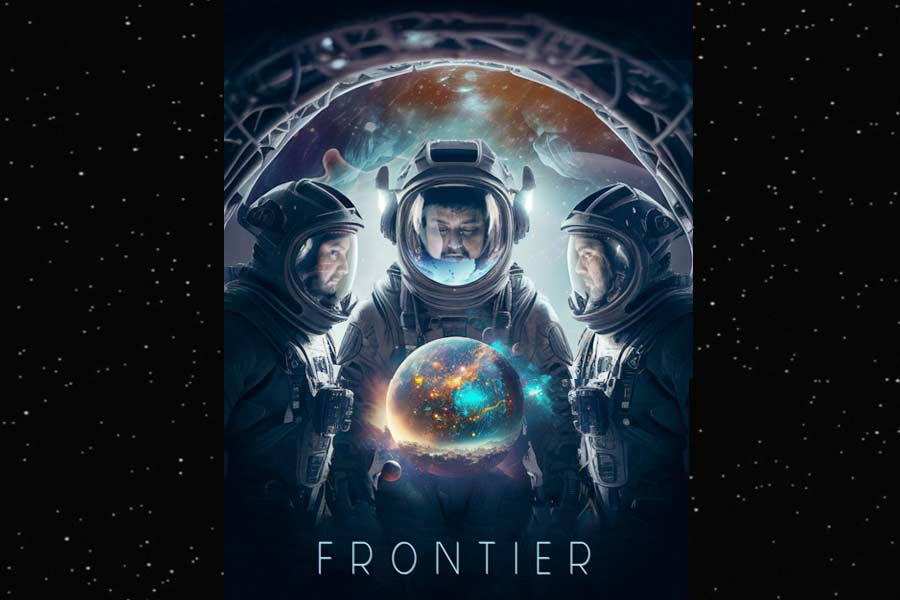The wall of Presidency University’s Baker Building had on it a curious poster. It read “March of the Sentinels”. On it was the face of a Nordic warrior and scribbled above were the words “Valhalla Events Presents”. It turned out to be publicity material for a heavy metal concert in Baranagar in the North 24-Parganas, 15 kilometres from Calcutta. The same poster was spotted at Jadavpur University, Calcutta University, Minerva Theatre... The concert was held in February this year.
Baranagar used to be an industrial centre. The Baranagar Jute Mill was here. The Indian Statistical Institute and one of the oldest Ramakrishna Mission schools too. But Baranagar as a venue for a heavy metal concert does not ring quite right in the ears.
Metal is a genre that has evolved out of rock music in the 1960s and 70s, mainly in the US and UK. To the layman the singing sounds like a lot of shouting. It is accompanied by loud drums, bass and distorted guitar sounds, which again come across as mindless noise to the uninitiated.
Baranagar resident Indradip Bhattacharya, 46, says that his hometown hosted rock concerts in the late 1990s. “I was myself an active member of the band Rock Breaker,” he adds. But those days, Rabindra Bhavan, where the sentinels marched/jammed this year, used to be the site of a genre called the jibonmukhi gaan. “Nachiketa and Suman (Chattopadhyay) performed here,” says Indradip. Even before that, people would flock to Rabindra Bhavan to watch Tagore’s dance dramas and classical music performances. The Rabindra Bhavans were set up by the state government across Bengal. These were meant to be cultural centres. Chinsurah, Serampore, Konnagar, Shyamnagar, Bhatpara, each has a Rabindra Bhavan.
But having cultural capital and being the cultural capital are different things. It is not commonplace to hear of a ticketed performance of bands playing psychedelic rock, glam metal, heavy metal and more, for 600 people in a place like Baranagar.
According to Swastik Ghosh, who is co-founder of Valhalla Events, in the last one year, there have been about 15 metal gigs in places like Garia (Calcutta), Sheoraphuli (Hooghly), Barrackpore (North 24-Parganas), Paikpara (Calcutta), Subhasgram (South 24-Parganas), Kalyani (Nadia), Konnagar (Hooghly) and Naihati (North 24-Parganas).
The audience comprises largely youth from mofussil towns. But the gap between Calcutta and the mofussil is not what it used to be even 10 years ago. Technology has been a great leveller. Most of the regulars at these gigs are students at institutions in Calcutta, many of them also hold jobs in the IT hub that is Salt Lake.
Mayukh Roy, 22, lives in Baranagar but goes to college in Calcutta’s Jadavpur University. He says, “Wherever there is metal I go, be it Topsia, Hazra, Park Street or New Town.” At the Baranagar gig, they roped in a band from Bangladesh — Sonar Bangla Circus. Subhajit Biswas, 27, is an IT professional from Barrackpore. He has been a metal enthusiast since he was in school. He says, “Metal is anti-religion. The followers of metal recognise the supremacy of music.”
Mayukh, Subhajit and their ilk are millennials. Their exposure to metal has been courtesy college fests as well as YouTube. In Bengal, the journey of metal music took off in 2008-09 with an organisation called Naktala Metal Palli. Later, Kolkata Old School Metal Association kept the show going between 2013 and 2018. The shows happened in Hazra’s Sujata Sadan, at Jogesh Mime Academy, in Rabindra Sadan. When Samrat Das, founder of metal bands Mortar and Falcun, first started listening to metal in 2006-07, the Internet was still a luxury in these parts. Smartphones were not the household thing as they are now. The only way one could access the music was by buying CDs and circulating them. He says, “We would also download German thrash and heavy metal — both genres of metal — from Torrent, from YouTube. There was another software called Limeware. Those days a music shop called Vibrations, on Free School Street in central Calcutta, used to promote this genre. They would sell CDs, T-shirts with names of metal bands on them. Slowly we got to know metal bands from the US and UK — Megadeth, Metallica, Anthrax, Slayer.”
Mortar does not exist anymore and Falcun is about nine years old. Samrat says, “In 2012-13, when I formed Mortar, there used to be less than 100 people at these gigs. Now the count is maximum 200. March of the Sentinels was an exception.” The audience paid Rs 300 per ticket.
5 Strings is a studio in south Calcutta’s Naktala; it is on the topmost floor of a three-storey house. Almost all the metal bands jam here. In the course of reporting this story, The Telegraph sits in on a rehearsal session. Thirst of Faust, a death metal band, is rehearsing that day. Argha Sen, 26, is at the drums, he is an IT professional. The lead guitarist Anindya Sarkar also has a degree in software engineering; he is from Baranagar. Lead vocalist Robby Dutta is singing — “Weak weep, sheep fell for deceit...” He is a corporate lawyer, lives in Dhakuria. The guitarist Pradyut Naha is 18, a tattoo artist.
The configuration of the bands is much like the audience. The band Warpath has five members — four men and one transwoman. Diptyesh Bhattacharyya, their lead singer, is doing his bachelor’s, guitarist Soumya Banerjee is an IT professional, Sourav Ghosh is a final-year BBA student, Sagnik Guha has a master’s in computer science and sound engineering. Akira is a freelance sound producer. Fire in the Rodeo’s Abhiroop Basu is a software engineer, Suvojeet Das, a BCA student, Nilavro Ghosh, a sports journalist; Shamboo Roy Choudhury, a video editor and Dhritiman Som is a freelance musician.
Warpath was formed in 2018, Thirst of Faust in 2019, Tandav in 2016, Tatva in 2021 and Journey to the Smoke in 2022. All bands sing originals. Most of them sing in English, but some in Bengali and English. The tracks have titles like Hero, Mephisto, A Bard’s Tale. The lyrics of Mortar’s Peacekeeper go thus. “Unholy spirits of the realm/ The Emperor grins, who’s to blame?” Warpath sings “Let them call him a hero,/Let them call him a demon,/Let him live for history,/Let him die a free man.” Journey To The Smoke sings about characters stuck in a maze.
“People who do metal are trying to convey a message to society at large,” says Swastik. And that message would be? Sagnik of Warpath says, “We are looking for equality.” Anindya of Thirst of Faust goes on and on about idle youth, about blurred ethics, blurred morals, lack of opportunities. Fellow band member Argha talks about a truant shepherd and sheep running amok. Sayan Bhowmick, a metal fan from Serampore, says, “The loud beating of the drum is the voice in our head. It is how we feel, constantly pushed to become what we cannot or we do not want to become. You call metal distorted music, we call it music that restores sanity.”












